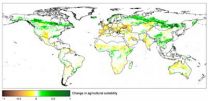(Press-News.org) Dartmouth researchers and their colleagues have built the first smartphone app that automatically reveals students' mental health, academic performance and behavioral trends. In other words, your smartphone knows your state of mind -- even if you don't -- and how that affects you.
The StudentLife app, which compares students' happiness, stress, depression and loneliness to their academic performance, also may be used in the general population – for example, to monitor mental health, trigger intervention and improve productivity in workplace employees.
"The StudentLife app is able to continuously make mental health assessment 24/7, opening the way for a new form of assessment," says computer science Professor Andrew Campbell, the study's senior author. "This is a very important and exciting breakthrough."
The researchers presented their findings on Wednesday at the ACM International Joint Conference on Pervasive and Ubiquitous Computing. The paper has been nominated for best paper at UbiComp, the top conference mobile computing. A PDF of the paper and a summary of the findings are available on request. They also released an anonymized version of the dataset in the hope that other social and behavioral scientists will use it in further studies.
The researchers built an Android app that monitored readings from smartphone sensors carried by 48 Dartmouth students during a 10-week term to assess their mental health (depression, loneliness, stress), academic performance (grades across all their classes, term GPA and cumulative GPA) and behavioral trends (how stress, sleep, visits to the gym, etc., change in response to college workload -- assignments, midterms, finals -- as the term progresses).
They used computational method and machine learning algorithms on the phone to assess sensor data and make higher level inferences (i.e., sleep, sociability, activity, etc.) The app that ran on students phones automatically measured the following behaviors 24/7 without any user interaction: sleep duration, the number and duration of conversations per day, physical activity (walking, sitting, running, standing), where they were located and how long they stayed there (i.e., dorm, class, party, gym), stress level, how good they felt about themselves, eating habits and more. The researchers used a number of well known pre- and post-mental health surveys and spring and cumulative GPAs for evaluation of mental health and academic performance, respectively.
The results show that passive and automatic sensor data from the Android phones significantly correlated with the students' mental health and their academic performance over the term.
Some specific findings: Students who sleep more or have more conversations are less likely to be depressed; students who are more physically active are less likely to feel lonely; students who are around other students are less likely to be depressed. Also, surprisingly, there was no correlation between students' academic performance and their class attendance; students who are more social (had more conversations) have a better GPA; students who have higher GPAs tend to be less physically active, have lower indoor mobility at night and are around more people.
The results open the door to the following breakthroughs for the first time:
your phone automatically knows if you are depressed, stressed or lonely;
the phone sensor data can predict student GPA;
coupled with intervention software, students can track their mental health and academic performance indicators with the goal of improving both;
the app (and its methods) are applicable to non-student groups, such as workplace employees, with the goal of improving productivity or radically reducing stress -- your phone will know how productive you are on a daily basis.
"Under similar conditions, why do some individuals excel while others fail?" Campbell says. "What is the impact of stress, mood, workload, sociability, sleep and mental health on academic performance? Much of the stress and strain of student life remains hidden. In reality faculty, student deans, clinicians know little about their students in and outside of the classroom. Students might know about their own circumstances and patterns but know little about classmates. To shine a light on student life, we developed the first of a kind smartphone app and sensing system to automatically infer human behavior."
Campbell says the smartphone app raises major privacy concerns, but with proper protections in place, the app can provide continuous mental health evaluation for people from all walks of life rather than waiting for symptoms of stress and depression to become severe enough to visit the doctor.
The Dartmouth researchers' next step for the StudentLife app is to provide feedback and intervention to help students boost their academic performance while living a balanced life on campus. The app also could be used in other ways, such as real-time feedback on campus safety and stress levels, students at risk and the quality of teaching at any moment.
"We purposely provided students with no feedback in this first study because we didn't want to use StudentLife as a behavioral change tool. We simply wanted to 'record' their time on campus," Campbell says. "Providing feedback and intervention is the next step. For example, we might inform students of risky behavior, such as partying too much, poor levels of sleep for peak academic performance, poor eating habits or being too socially isolated."
INFORMATION:
Professor Andrew Campbell is available to comment at campbell@cs.dartmouth.edu
Broadcast studios: Dartmouth has TV and radio studios available for interviews. For more information, visit: http://www.dartmouth.edu/~opa/radio-tv-studios/
New Dartmouth smartphone app reveals users' mental health, performance, behavior
2014-09-18
ELSE PRESS RELEASES FROM THIS DATE:
Fall foliage season may be later, but longer on warmer Earth
2014-09-18
The fall foliage season that prompts millions of Americans to undertake jaunts into the countryside each year could come much later and possibly last a little longer within a century, according to new research.
Climate change could postpone fall leaf peeping in some areas of the United States as summer temperatures linger later into the year, Princeton University researchers report in the journal Global Ecology and Biogeography. For instance, the paper birch — a popular foliage tree that is the state tree of New Hampshire — could change color one to three weeks later ...
Want to link genes to complex traits? Start with more diversity
2014-09-18
Life is rarely simple. From crop yields to disease risks, the biological characteristics people care most about are usually those considered "complex traits." Just as for height—the textbook example of a complex trait—attributes like risk for a particular human disease are shaped by multiple genetic and environmental influences, making it challenging to find the genes involved. To track down such genes, geneticists typically mate two individuals that differ in key ways—for example, a large mouse and a small mouse—and then study their descendents, looking for genes that ...
Americans rate losing eyesight as having greatest impact on their lives
2014-09-18
ALEXANDRIA, Va.—Sept. 18, 2014—Many Americans across racial and ethnic groups describe losing eyesight as potentially having the greatest impact on their day-to-day life, more so than other conditions including: loss of limb, memory, hearing and speech (57% of African-Americans, 49% of non-Hispanic whites, 43% of Asians and 38% of Hispanics). When asked which disease or ailment is the worst that could happen to them, blindness ranked first among African-Americans followed by AIDS/HIV. Hispanics and Asians ranked cancer first and blindness second, while Alzheimer's disease ...
Living in a disadvantaged neighborhood worsens musculoskeletal pain outcomes after trauma
2014-09-18
CHAPEL HILL, N.C. – Individuals living in disadvantaged neighborhoods have worse musculoskeletal pain outcomes over time after stressful events such as motor vehicle collision than individuals from higher socioeconomic status neighborhoods, even after accounting for individual characteristics such as age, sex, income, education, and employment status.
These were the findings of a multi-site research study led by Samuel McLean, MD, MPH, associate professor of anesthesiology and emergency medicine at the University of North Carolina School of Medicine. The results of the ...
Global agriculture: More land, fewer harvests
2014-09-18
According to a simulation of the impact of climate change on agricultural production over the course of the 21st century, carried out by researchers led by Professor Wolfram Mauser at LMU's Department of Geography, some two-thirds of all land potentially suitable for agricultural use is already under cultivation. The study indicates that climate change will expand the supply of cropland in the high latitudes of the Northern hemisphere (Canada, Russia, China) over the next 100 years. However, in the absence of adaptation measures such as increased irrigation, the simulation ...
Withdrawal from the evolutionary race
2014-09-18
This news release is available in German. In ecology, disease tolerance is defined as a host strategy not to fight a pathogen tooth and nail, but rather tolerate it to live (and survive) better in the long term. One key feature of tolerance is that the disease only progresses very slowly – if at all – even if the host carries a high pathogen load.
Roland Regoes, a senior scientist at ETH Zurich's Institute of Theoretical Biology, has now transferred this approach to HIV. He set about investigating whether there are infected people who are more tolerant of the HI virus ...
Decision-support program helps keep seniors out of the emergency room
2014-09-18
New Rochelle, NY, September 18, 2014–An Emergency Room Decision-Support (ERDS) program can significantly reduce ER visits and hospital admissions among older adults on Medicare. This could have important economic implications, helping to reduce the nearly 33% of avoidable ER visits that contribute to about $18 billion in unnecessary healthcare costs each year. Details of a successful ERDS program that had a positive return on investment are published in an article in Population Health Management, a peer-reviewed journal from Mary Ann Liebert, Inc., publishers. The article ...
Language evolution: Quicker on the uptake
2014-09-18
The ability to acquire and creatively manipulate spoken language is unique to humans. "The genetic changes that occurred over the past 6 million years of human evolution to make this possible are largely unknown, but Foxp2 is the best candidate gene we now have," says Wolfgang Enard, Professor of Anthropology and Human Biology at LMU. In his efforts to understand the molecular biological basis of language Enard has now taken an important step forward. The results of his latest study, undertaken in collaboration with scientists at several universities, including the Massachusetts ...
First eyewitness accounts of mystery volcanic eruption
2014-09-18
This eruption occurred just before the 1815 Tambora volcanic eruption which is famous for its impact on climate worldwide, with 1816 given memorable names such as 'Eighteen-Hundred-and-Froze-to-Death', the 'Year of the Beggar' and the 'Year Without a Summer' because of unseasonal frosts, crop failure and famine across Europe and North America. The extraordinary conditions are considered to have inspired literary works such as Byron's 'Darkness' and Mary Shelley's Frankenstein.
However, the global deterioration of the 1810s into the coldest decade in the last 500 years ...
Lunar explorers will walk at higher speeds than thought
2014-09-18
Anyone who has seen the movies of Neil Armstrong's first bounding steps on the moon couldn't fail to be intrigued by his unusual walking style. But, contrary to popular belief, the astronaut's peculiar walk was not the result of low gravity. Wyle Science, Engineering and Technology scientist John De Witt explains that the early space suits were not designed for walking, so the astronauts adapted their movements to the restrictions of the suit. Michael Gernhardt, the head of NASA's Extravehicular Activity Physiology, Systems and Performance Project, wants to learn more about ...



